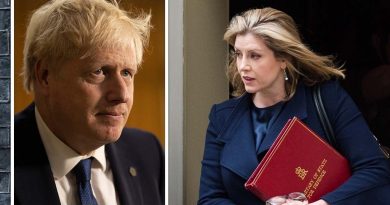Biden Appointee To Postal Service Board Targets ‘Greatest Risk In Security’ For Elections
The U.S. Postal Service literally delivered the 2020 election. As millions of voters cast their ballots by mail during the coronavirus pandemic in November, postal workers labored to make sure those ballots reached voters and then were sent back to election officials on time.
This came in the face of aggressive efforts by then-President Donald Trump to cast doubt about the legitimacy of mailed ballots, while Louis DeJoy, who became postmaster general under Trump, enacted a series of policy changes that dramatically slowed down overall mail delivery times.
Now President Joe Biden has appointed three new members to the board that oversees the USPS, and one, Amber McReynolds, was clearly selected with these troubles in mind. She is the only postal governor in the agency’s recent history with a deep background in running elections, and she told HuffPost that repairing the damaged faith in the Postal Service’s role in carrying out the functions of democracy is her priority.
“I do think it’s the greatest risk in security for our elections,” she said in a recent interview. “Disinformation and lies.”
“The Postal Service is vulnerable to that disinformation,” she added. “The minute you start seeing a deterioration in trust and service, and people can’t get access to information as to why,” it gives conspiracy theories a toehold.
There are lots of ways government agencies can let citizens down, but the Postal Service is one of the agencies consistently rated the most trustworthy by the public.
“It’s largely responsible for connecting the government to its citizens and citizens to each other, the public to commerce, since the founding of our country,” McReynolds said. “This institution is a lifeline to many communities.”
When the mail isn’t reliable — when people suffer lost paychecks and late medication — it creates an opening for bad faith actors who deliberately want to erode the country’s trust in the mail, and the government, she said.
McReynolds is the chief executive officer of the National Vote at Home Institute. For more than a decade, she oversaw elections in Denver, where she worked hand-in-glove with post office officials to run local elections, and she pioneered a system to let voters track their mail-in ballots. NVHI, which advocates for allowing as many Americans as possible to participate in elections by voting by mail, was instrumental in pushing states to prepare for an unprecedented wave of mail-in ballots spurred by the COVID-19 pandemic.
Last year tested all that.
“There was, all year long, a concerted effort to create distrust in the process,” McReynolds said. “There were people talking about how to create mistrust in the process. I never expected to fact-check the White House all year long, but I did. That’s so destructive to our democracy.”
Worse yet, she said, now “people are using those lies to restrict voting access by design.” Republicans, leaning on the lie that Biden stole the presidential election from Trump, have proposed 250 restrictions in 43 states aimed at curtailing voting rights.
For McReynolds in her new role, all this raises the challenge of making sure the mail remains trustworthy in the view of most Americans.
The Postal Service is expected to lose billions of dollars in future years as its traditional moneymaker, postage on mail, becomes less relevant and massive pension obligations strain its balance sheets.
Over the past year, the mail has become slower and less predictable than it has been in decades. The pandemic, its toll on the USPS workforce and a huge uptick in package volume is partly to blame. But so is DeJoy, a selection of Trump’s postal board, who has fueled the agency’s problems with disruptive changes to longstanding delivery practices, such as an emphasis on efficiency rather than timeliness.
As president, Trump led a direct assault on public trust in the Postal Service by threatening funds it needed to handle a pandemic-era tidal wave of voting by mail. The USPS took extraordinary measures to ensure that ballots were delivered in time, but that didn’t stop a significant share of the public from doubting that the USPS was up to the task. Republican leaders fed false claims that voting by mail was not secure, while Democrats eyed very real delays in the mail and worried how many votes wouldn’t arrive before counting deadlines.
And the USPS, while it delivered an overwhelming majority of ballots speedily and on time, completely lacked the technology to track all ballots in real time and reassure the public of its success.
But just as millions of shoppers will probably keep up their pandemic habits of relying on the mail and e-commerce for many goods, millions are likely to keep voting by mail long even after the pandemic ends.
A year from now, McReynolds would like for much of the country to experience the same mail delivery speeds as it did before the pandemic. She would like for the entire country to experience the kind of reliability it did before the pandemic, meaning when you put something in the mail, the post office should be able to give you a clear expectation of when it will arrive and then meet that expectation.
She envisions a safer workforce — during the pandemic, dozens of postal workers died of COVID-19 and thousands more contracted the disease — and “a more full-time workforce.” And she is agitating for the USPS to undergo a massive upgrade in technology needed to keep delivering packages in record numbers.
McReynolds, who was confirmed May 13, is an independent, but Democrats have now appointed a one-seat majority of the board. The governing board is not likely to fire DeJoy, although many Democrats are clambering for his removal. But it can rein in his plans to slow down service and make major cuts.
Biden’s other appointees are both Democrats: Anton Hajjar, who served as general counsel for the American Postal Workers Union — it represents workers in distribution and sorting centers, which were clobbered by COVID-19, and is the most liberal and vocal of the postal unions — and Ron Stroman, who was the No. 2 at the USPS until 2020. From his time in that role, Stroman, the only Black member of the board, is also keenly aware of how the Postal Service supports U.S. elections.
McReynolds’ nomination reflects the extent to which U.S. elections rely on a functioning post office and the fact that the Biden administration understands how closely the mail and the democratic process are linked.
During the 2020 elections, the National Vote at Home Institute advised states on how to change their laws and practices to accommodate an unprecedented shift to absentee voting, whether that meant expanding who was eligible to vote by mail or changing deadlines to request, send and process absentee ballots in order to guarantee that the mail could deliver the ballots on time.
At times, the group ran headlong into the Trump administration’s assault on absentee voting. Its push for states to process mail-in ballots before Election Day, to avoid big delays in results, was partly thwarted by Trump’s false claims that mail-in votes were fraudulent votes.
For states that made no moves to avoid chaos, “everything we said came true,” McReynolds said. Those with no plan for how to count millions of ballots quickly experienced big delays in reporting their election results.
“We have to do whatever we can to root out the partisan politics that have made their way into election administration because it’s not healthy and voters don’t want it either,” she said recently. “It’s going to take an all-of-community effort ― the local officials, election officials, local reporters, national news reporters, everyone has to play a role in addressing this viral disinformation, conspiracies being spread every day during the election and still today.”
RELATED…
Source: Read Full Article



